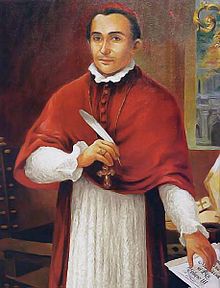Miguel de Benavides
|
The Most Reverend Miguel de Benavides |
|
|---|---|
| Archbishop of Manila | |
 |
|
| Province | Manila |
| See | Manila |
| Installed | October 7, 1602 |
| Term ended | July 26, 1605 |
| Predecessor | Ignacio Santibáñez, O.F.M. |
| Successor | Diego Vázquez de Mercado |
| Other posts | Bishop of Nueva Segovia |
| Orders | |
| Ordination | 1568 |
| Personal details | |
| Born | c. 1552 Carrion de los Condes, Spain |
| Died | 26 July 1605 (aged 52–53) Manila, Captaincy General of the Philippines |
| Nationality | Spanish |
| Denomination | Roman Catholic |
|
Styles of Arzobispo Miguel de Benavides |
|
|---|---|
 |
|
| Reference style | Monseñor |
| Spoken style | Su Excelencia Reverendísima |
| Religious style | Reverendísimo |
Miguel de Benavides y Añoza (c. 1552 – July 26, 1605) was a Spanish clergyman and sinologist who was the third Archbishop of Manila. He previously served as the first Bishop of the Diocese of Nueva Segovia, and was the founder of the University of Santo Tomas in the City of Manila.
Miguel de Benavides was born in 1552, to a noble family in Carrión de los Condes, Spain. He entered the Dominican Order in San Pablo de la Moraleja, Valladolid, and later rendered service in Colegio de San Gregorio.
He joined the first group of Dominicans going to Manila in 1587, proceeding with them on to China where he hoped to expand the local Catholic church. He was later exiled, and established a hospital for the Chinese in Binondo, Manila, before becoming the head of his order. He accompanied Archbishop Domingo de Salazar to Spain to defend the native Filipinos against Spanish oppression.
He was appointed as the first bishop of Nueva Segovia and was consecrated in Mexico in 1597. He authored the Doctrina Christiana in Chinese, the first book printed in the Philippines. He arrived in Nueva Segovia in 1599 but was, after three years, appointed as the Archbishop of Manila on October 7, 1602. His installation in Manila was financed by King Philip III himself, for Benavides was extremely poor. On September 9, 1603, he directed the Franciscans to oversee the Japanese staying in the Philippines. In the same year, he warned the government about the nascent revolt of the Chinese population although he was also criticized for inciting it with his sermons.
...
Wikipedia
